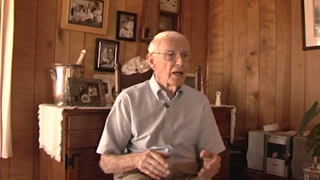6:02 | The 57th Fighter Group moved from field to field, following the British around North Africa. They watched as British artillery pounded El Alamein and they took cover as German planes came after them. The Germans were finished in Africa, though, and Gordon Markle describes an operation that became known as the Palm Sunday Massacre.
Keywords : Gordon Markle Africa El Alamein British Tripoli Axis Sally radio Roman ruins German bomb shrapnel Palm Sunday Massacre Cape Bon Tunisia Spitfire Sicily Operation Flax Bernard Montgomery

It was two years before Pearl Harbor when Gordon Markle enlisted in the Army Air Corps because he couldn't afford technical school. At first, he was with the ground crew in a bomber unit. He soon moved to fighters, which made him happier. Even before hostilities broke out he saw death close up with a spectacular crash during training.
Four thousand men boarded a troop ship in New York Harbor and what they saw in the next berth was not what Gordon Markle needed to see. He was a crew chief headed to North Africa with the 57th Fighter Group.
The British had battled the Germans back and forth across North Africa and American P-40's had arrived to provide some additional air power. Crew chief Gordon Markle describes what that was like with the sandstorms, the C-rations from another war, and the German air attacks. He also learned that you don't want to cross the Gurkhas.
A year after he enlisted, Gordon Markle was in the Sahara, keeping P-40's flying in the waning days of the North Africa campaign. His flight chief came to his tent and said there was someone there to see him. It was his father.
Gordon Markle never had much leave but he did manage to buy a French flag in Alexandria. Or did he? It was a relief to get out of the desert when the war moved to Southern Europe. In Corsica, he got to ride along on a PT boat that sank a German vessel.